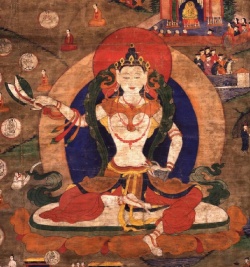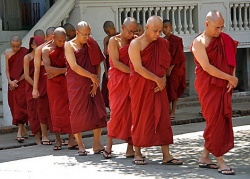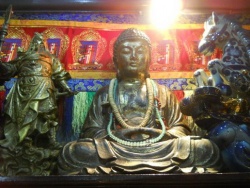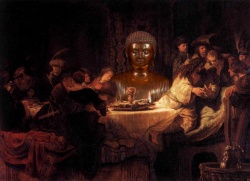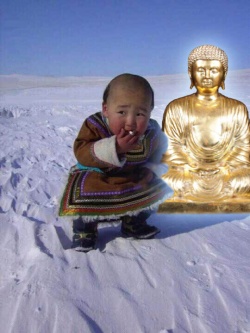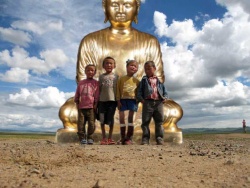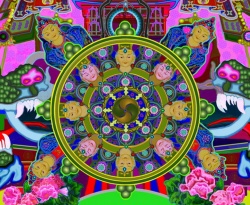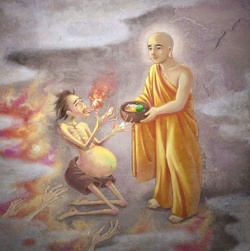Aṅguttara Nikāya - Nipāta 5-11
Written by Red Zambala
Monday, 14 July 2014
(5) Pañcaka Nipāta Pāḷi
1. There are five strengths possessed by a person in training for higher knowledge:
faith, shame (to do evil), moral dread, energy and insight-knowledge.
He believes in the enlightenment of the Buddha; he feels ashamed of wrong conduct in deed, word and thought; he dreads anything evil and unwholesome; he arouses energy to abandon everything unwholesome and to acquire everything that is wholesome;
he perceives the phenomenon of constant rising and ceasing and is thus equipped with insight which will finally lead him to Nibbāna, destruction of suffering. (para 2)
2. There are also other five strengths, namely: faith, energy, mindfulness, concentration and insight-knowledge.
The strength of faith is seen in the four characteristic qualities of a Stream-winner;
the strength of energy is seen in the four Right Efforts;
the strength of mindfulness is seen in the Four Methods of Steadfast Mindfulness and
the strength of concentration is seen in the four jhānas;
the strength of insight-knowledge is seen in the perception of the phenomenon of constant rising and ceasing, an insight which will finally lend to Nibbāna. (para 14)
3. Impurities that defile gold are iron, tin, lead, silver, and other metals.
Impurities that defile mind are sensuous desire, ill will, sloth and torpor, restlessness and worry, sceptical doubts. (para 23)
4. A giver of alms surpasses a non-giver in five aspects, namely:
in life¬span, beauty, happiness, fame and power, whether both be reborn in the deva world or the human world.
This difference in five aspects will persist till liberation is achieved. There is then no distinction between the liberation of one and the other or between one Arahat and the other. (para 31)
5. There are five contemplations which ought to be practised by everyone, bhikkhus or lay-folks, men and women:
I. I am certain to become old. I cannot avoid ageing.
II. I am certain to become ill and diseased. I cannot avoid illness.
III. I am certain to die. I cannot avoid death.
IV. All things dear and beloved will not last. They will be subject to change and separation.
V. My kamma (past and present actions) is my only property, kamma is my only heritage, kamma is the only cause of my being, kamma is my only kin, my only protection. Whatever actions I do, good or bad, I shall become their heir.' (para 57)
6. Five standards which should be set up for teaching the Dhamma:
I. the Dhamma should be taught in graduated discourses;
II. the Dhamma should be given as a well-reasoned discourse;
III. the Dhamma should be given out of compassion and sympathy;
IV. the Dhamma should not be given for the sake of worldly gain and advantage;
V. the Dhamma should be taught without alluding to oneself or others. (para 159)
7. There are five ways of getting rid of a grudge: If a grudge arises towards any person, then:
one should cultivate loving-kindness, or compassion or equanimity towards him. Or one should pay no attention to him and give no thought to him.
Or one may apply the thought: his only property is his actions; whatever he does, good or bad, he will be heir to that. In these ways, all grudges that have arisen can be removed. (para 161)
8. Wrong occupations which should not be followed by a lay disciple:
I. Trading in arms and weapons;
II. trading in living beings;
III. trading in meat;
IV. trading in intoxicants;
V. trading in poison. (para 177)
(6) Chakka Nipāta Pāḷi
1. There are six things which are unsurpassed:
The noblest things seen, the noblest things heard, the noblest gain, the noblest learning, the noblest service, and the noblest reflection. The sight of the Tathagata or the Tathagatas disciples is the noblest thing seen.
The hearing of the Dhamma from the Tathagata or his disciples is the noblest thing heard. Faith in the Tathagata or his disciples is the noblest gain.
Learning supreme virtue (adhiśīla), supreme mind development (adhicitta), supreme wisdom (adhipaññā) is the noblest learning.
Serving the Tathagata or his disciples is the noblest service. Reflecting on the virtues of the Tathagata or his disciples is the noblest reflection. (para 30)
2. There are six kinds of suffering in the world for one who indulges in sense-pleasures:
poverty, indebtedness, owing interest, being demanded repaying, being pressed and harassed by creditors, imprisonment.
Similarly in the Teaching of the Ariyas,
a person is regarded to be poor and destitute who lacks faith in things that are meritorious, who has no shame and no scruples, no energy and no understanding of things that are good, and who conducts himself badly in deed, word and thoughts. (para 45)
3. There are six steps to gain liberation:
Sense-control provides the basis for morality.
Morality gives the foundation to Right Concentration.
Right Concentration provides the basis for understanding of the true nature of physical and mental phenomena.
With understanding of the true nature of physical and mental phenomena comes disenchantment and non-attachment.
Where there is disenchantment and non-attachment, there arises the knowledge and vision of liberation. (para 50)
4. There are six things to be known:
Sense-desires, feelings, perceptions, moral intoxicants (āsavas), kamma and dukkha should be known, their causal origin should be known, their diversity, their resulting effects, their cessation and the way leading to their cessation should be known.
The way leading to the cessation of all these dhammas is the Noble Path of Eight Constituents. (para 63)
5. There are six things which appear very rarely in the world:
I. Rare is the appearance in the world of a Perfectly Enlightened Buddha;
II. rare is the appearance of one who teaches the Dhamma and Vinaya as proclaimed by the Buddha;
III. rare it is to be reborn in the land of the Ariyas;
IV. rare it is to be in possession of unimpaired physical and mental faculties;
V. rare it is to be free from dumbness and stupidity;
VI. rare it is to be endowed with the desire for doing good, wholesome things. (para 96)
6. There are six benefits in realizing the Sotāpatti Fruition:
- firm faith in the Dhamma;
- impossibility of falling back;
- limit to suffering in the round of existences (only seven more existences);
- being endowed with supra-mundane knowledge which is not shared by the common worldling; and
- clear understanding of causes and phenomena arising therefrom. (para 97)
(7) Sattaka Nipāta Pāḷi
1. There are seven factors for winning respect and esteem of fellow bhikkhus:
having no desire for gain; not wanting to be shown reverence but indifferent to attention; being ashamed of doing evil; being fearful of doing evil; and having little want; and having the right view. (para 1)
2. A bhikkhu becomes an eminent field for sowing seeds of merit, when:
he knows the text of the Teaching, knows the meaning of the Teaching, also knows himself, knows the proper limit for acceptance of offerings, knows the proper time for various activities, knows his audience, and knows the spiritual tendency of an individual. (para 68)
3. If a bhikkhu develops his mind in the four methods of Steadfast Mindfulness, the four Right Efforts, the four bases of Psychic Power, the five Faculties, the five Strengths, the Seven Factors of Enlightenment, the Noble Path of Eight Constituents,
he will be freed of the mental intoxicants, without any attachment, whether he wishes or not for liberation. (para 71)
4. Short is the life of man, just like the dew-drop on the tip of a blade of grass; a bubble appearing on the water when rain falls; a line drawn on water with a stick; a mountain stream;
a lump of spittle on the tip of the tongue; a piece of meat thrown into an extremely hot iron pot; and a cow being led to be slaughtered, whenever she lifts a leg, she will be closer to slaughter, closer to death. (para 74)
5. Those teachings that lead to disenchantment, entire turning away from worldliness, non-attachment, cessation and calm, direct knowledge, enlightenment and Nibbāna —
such teachings may be taken as the true Dhamma and Discipline, as the Buddhas Teaching. (para 83)
(8) Aṭṭhaka Nipāta Pāḷi Nipāta Pāḷi
1. There are eight benefits accruing from practice of meditation on loving-kindness:
Whosoever practises meditation on loving-kindness enjoys sound sleep, wakes up fresh and well, is not disturbed by bad dreams, is regarded with esteem by men,
is treated with respect by non¬humans, is accorded protection by devas, is not hurt by fire, poison or weapons and is destined to reappear in the Brahma realm. (para 1)
2. There are eight worldly conditions, the vicissitudes of life that keep the world turning round: gain, loss, fame, disrepute, praise, blame, happiness, suffering. (para 546)
3. There are eight strengths:
The strength of child lies in crying; of a woman in her anger; of a bandit in his arms; of a king in his sovereignty; of an unwise man in censure and reviling;
of a wise man in careful consideration of pros and cons; of a man of knowledge in caution; and the strength of a bhikkhu lies in his fortitude and forbearance. (para 27)
4. Eight great reflections of the Venerable Anuruddha on the Dhamma:
I. This Dhamma is for one with few wants, not for one who wants much.
II. This Dhamma is for the contented, not for one hard to be satisfied.
III. This Dhamma is for one who loves solitude, not for one who loves company.
IV. This Dhamma is for the energetic, not for the indolent.
V. This Dhamma is for one of vigilant mindfulness, not for the heedless.
VI. This Dhamma is for one of concentrated mind, not for the distracted.
VII. This Dhamma is for the wise, not for the unintelligent.
VIII. This Dhamma is for one who delights in Nibbāna, not for one who rejoices in worldliness(conceit, craving and wrong view). (para 30)
5. There are eight types of speech by an Ariya:
I. Having not seen, he says he has not seen;
II. having not heard, he says he has not heard;
III. having not sensed, he says he has not sensed;
IV. having not known, he says he has not known.
V. Having seen, he says he has seen;
VI. having heard, says he has heard;
VII. having sensed, he says he has sensed and
VIII. having known, he says he has known. (para 68)
(9) Navaka Nipāta Pāḷi
1. Nine practices not indulged in by Arahats:
An Arahat does not intentionally take the life of a being; does not take, with the intention of stealing, what is not given; does not engage in sexual intercourse; does not speak what is not true knowing that it is not true; does not enjoy the
2. pleasures of the senses; is not biased through favouritism, through hatred, through delusion or through fear. (para 7)
3. There are nine characteristics of a lay-mans residence which a bhikkhu should not visit or stay in:
Where a bhikkhu is not greeted or shown signs of welcome, or offered a seat; where alms are kept hidden; where little is given away although much can be afforded; where inferior alms are offered although better alms are available;
where the offering is made in a disrespectful manner; where the layman does not come near the bhikkhu to listen to the dhamma, and where little interest is shown in the exposition of the dhamma. (para 17)
4. There are nine ways in which a grudge is formed:
He has done me harm, he is doing me harm, he will do me harm; he has done harm to one dear to me, he is doing harm to one dear to me,
he will do harm to one dear to me; he has done good to one disliked by me; he is doing good to one disliked by me, he will do good to one disliked by me. (para 29)
5. There are nine things which should be eliminated in order to achieve realization of Arahatta Phala:
Lust, ill will, ignorance, anger, grudge, ingratitude, envy, jealousy, meanness. (para 62)
(10) Dasaka Nipāta Pāḷi
1. There are ten benefits of being established in śīla, morality:
One who is established in śīla feels pleased; feeling pleased he feels glad; feeling glad, he is delightfully satisfied; being delightfully satisfied he becomes calm;
when he is calm, he feels happiness; when he feels happiness, his mind becomes concentrated; with concentrated mind, he sees things as they really are;
seeing things as they really are, he becomes disenchanted and dispassionate towards them; when there is no more passion or attachment, he achieves liberation of mind and liberation by knowledge. (para 1)
2. There are ten fetters:
Personality belief (Sakkāyadiṭṭhi), sceptical doubts, mistaking mere rites and ceremony as the true Path, sense-desire, ill will, attachment to Rūpa realm, attachment to Arūpa realm, conceit, restlessness, ignorance. (para 12)
3. Just as a young man or a woman looks into the mirror to find out if there are any blemishes on the face,
so also it is necessary for a bhikkhu to engage in occasional self-examination to see whether covetousness, ill will, sloth and torpor have arisen in him or not,
whether worry and excitement, and doubts exist in him, whether he is free from anger and his mind is defiled or not by unwholesome thoughts;
whether his body is at ease without restlessness; whether he is beset by laziness or not; and whether he has concentration of mind with clear comprehension. (para 51)
4. There are ten dhammas possessed by one who has become accomplished, an Arahat:
Right View, Right Thought, Right Speech, Right Action, Right Livelihood, Right Effort, Right Mindfulness, Right Concentration, Right Knowledge, Right Liberation. (para 112)
(11) Ekādasaka Nipāta Pāḷi
1. There are eleven kinds of destruction any one of which is likely to befall a bhikkhu who reviles the fellow bhikkhus of the community:
Lack of progress in his efforts; declining from the stage already achieved; tainted and defiled understanding of the Dhamma; being overcome by his own conceit;
unhappiness in leading the holy life; liability to commit offences against the disciplinary rules; likelihood of reverting to the household life; likelihood of being afflicted with an incurable disease;
likelihood of becoming mentally deranged; dying with a confused mind and likelihood of being reborn in the Nether Worlds. (para 6)
2. There are eleven benefits derived from cultivation and development of loving-kindness, when frequently practised and firmly established:
One sleeps soundly and wakes peacefully with no bad dreams; one is regarded with esteem by men; is treated with respect by non-humans; is protected by devas; is unharmed by fire, poison or weapons;
his mind is easily concentrated; the features of his face are serene; he will die with an unconfused mind; if he does not attain to Arahatship, he will be reborn in the Brahma realm. (para 15)
